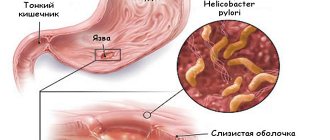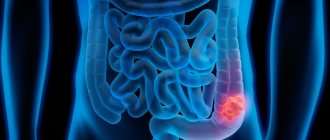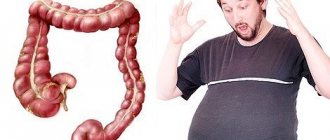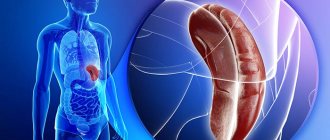Loud rumbling in the stomach causes a person a lot of discomfort and trouble. The noisy digestive process makes itself felt at the wrong moment, especially often during times of psychological stress. This usually happens when you need to focus your efforts on an important task - an important exam, a presentation, a speech at a work meeting. After all, stress is one of the predisposing factors. The owner of an overactive digestive tract experiences not only psychological and social problems. Disturbances in the functioning of the body can have serious consequences.
- 2 Types of rumbling in the stomach
- 3 Causes and development factors
- 4 Diagnostics
- 5 Methods for treating stomach rumbling
5.1 Drug therapy
- 5.2 Role of diet
5.2.1 Products that cause increased gas formation in the intestines - photo gallery
- 5.3.1 Plants used to treat stomach rumbling - photo gallery
Abdominal noises - normal or pathological
Rumbling in the stomach is a spectrum of sounds of varying intensity coming from the organs of the gastrointestinal tract as a result of the movement of gases, liquid or food bolus. A healthy hungry rumbling is inherent in every person. Once in the stomach and then in the intestines, food is broken down due to the secretion of digestive juices inside these organs. For effective treatment, the walls of the gastrointestinal tract are constantly compressed.
Rumbling in the stomach can indicate problems in any organ of the digestive tract
Regardless of the presence of food in the stomach, the muscles contract. If the lumen of the organ is empty, then the gases, air and hydrochloric acid inside interact with each other. Rumbling or other noises occur. When the stomach is full, food, pressing against the walls, dampens the sound. It happens that the “songs” of the stomach are heard regardless of food intake, not only from the stomach. Similar sounds also come from different parts of the intestines. Such noises are not normal, but act as a pathological symptom. They talk about disturbances in the processing and absorption of nutrients at any stage of digestion. The sounds are accompanied by putrefactive processes, excessive gas formation, and an inadequate reaction of the intestinal walls to certain irritants. Abdominal noises may resemble:
- pouring or gurgling;
- bubbling;
- rumbling;
- growl.
In the medical literature, these names are most often used interchangeably, since it is not possible to identify one characteristic sound for a specific symptom. To a greater extent, the nature of the sound depends on the condition and individual characteristics of a particular person.
Calm the gut
If your stomach is constantly rumbling very loudly, you need to contact a gastroenterologist to solve the physiological and social problem. The doctor will identify the reasons and prescribe treatment based on this. What to do if your stomach is constantly rumbling? An important task is to get rid of the causes of this discomfort:
- You need to adjust your diet. To restore disturbances in microflora and intestinal functions, the doctor prescribes medications with bifidobacteria. Associated ailments must be cured.
- To normalize gas formation, infusions of fennel, dill, and caraway are used.
- If there is flatulence, then the gas outlet tube will be an emergency aid. Activated carbon, Polyphepan, Enterosgel, which absorb gases that have accumulated in the intestines, help. Simethicone and Espumisan help with excessive gas formation.
Types of rumbling in the stomach
The nature of the rumbling indicates the possible origin of the pathology.
The intensity of the sound can be expressed:
- weak or moderate - as part of the normal physiological process, if a person is hungry;
- strong - if the sound is too frequent and loud, it can be heard not only by you, but also by a stranger. All this indicates the need to find out the cause.
Noises may appear:
- in the morning and in the evening;
- at night;
- constantly (regardless of the time of day).
Unpleasant sounds that occur on the left or right in different places of the abdomen can manifest themselves most intensely in the morning on an empty stomach or in the evening and at night. Most often they are observed after a heavy meal the day before, which caused overload of the digestive tract.
The presence of sounds may be due to the fact of eating. Noise bothers a person:
- on an empty stomach;
- some time after eating;
- regardless of the meal.
Transfusion in the stomach after eating (systematic or too loud) indicates that the stomach or intestines are not working quite normally. If you experience bloating and nausea after eating, you should see a doctor. This may be a sign of a number of diseases, including developing gastritis. Inflammation of the gastric mucosa can lead to future ulcers if left untreated. Rumbling can be observed several hours after a meal. In this case, the process of food absorption may be disrupted.
The digestive tract is a complex factory for the breakdown and absorption of nutrients
Quite loud sounds can be made by both the stomach and intestines. Noises are distinguished by localization:
- in the upper abdomen - stomach, duodenum;
- in the lower part - the small and large intestines.
A person sometimes notes the dependence of the occurrence of rumbling in the stomach on the position of the body in space. For example, he doesn’t experience any problems while sitting or standing, but just lie down (including after eating) and long “howls” begin. A gastroenterologist can judge the nature of sounds by the position in which the patient experiences maximum discomfort:
- rumbling predominantly in a horizontal position may be due to poor outflow of bile in this position, when digestion is disrupted;
- when seething in a vertical position (sitting or standing), the causes should be determined using laboratory and instrumental diagnostics.
Hyperactivity of the gastrointestinal tract can increase under circumstances that require nervous tension: during exams at an educational institution, an important work meeting. This fact will indicate the vegetative-vascular or functional nature of the pathology.
What else is it associated with?
Why does my stomach constantly growl? This occurs from gases in the large intestine:
- This is the lower section of the gastrointestinal tract, which performs 2 functions. In this case, water is removed by suction. Remains of food are eliminated out in the form of feces, where bacteria are located. They perform digestion of leftover food, so gases appear at the end of the intestines.
- Methane, mercaptan, hydrogen, carbon dioxide and sulfur dioxide are present here. The first 2 compounds have an unpleasant odor because they have organoleptic and toxic properties. A large volume of gaseous substances can cause a toxic effect.
- These substances must be removed from the body, as this is an important physiological process. Often after overeating, excessive consumption of carbonated drinks, prunes, cabbage, apples, peas, alcohol, flatulence is observed - severe gas formation.
- It is necessary to limit heavy foods, which increase gas formation. If a person needs to communicate with people, it is advisable not to consume foods that lead to this problem.
These are common reasons why your stomach constantly growls. Nutrition is of great importance. You should be careful when choosing products.
If your stomach is constantly rumbling, what else could be the reason? Experts also associate this with hunger:
- The feeling of hunger occurs when there is a lack of nutritional components in the blood. A notification about this goes to a special part of the brain that regulates the activity of the gastrointestinal tract.
- The brain center of hunger activates the gastrointestinal tract, which causes the secretion of gastric juice. During this process, characteristic sounds are observed. You just need to eat to eliminate unpleasant sounds.
Diagnostics
In order to determine the causes of pathological sounds, it is first necessary to exclude organic changes and associated diseases. Along with studying the patient’s symptoms, a physical examination (feeling the abdomen, examining the oral cavity), a number of laboratory and instrumental studies are also used:
- general and biochemical blood test;
- bacteriological culture of stool;
- examination of stool for the presence of hidden blood and increased amounts of fat.
Deviations from the norm, identified by laboratory methods, indicate the organic nature of the pathology. The absence of changes for the worse indicates the mental, neurological or allergic nature of the problem.
A set of instrumental diagnostic methods is used:
- Ultrasound examination (ultrasound) of the abdominal organs allows you to evaluate the physical parameters of the liver, gallbladder and ducts, pancreas, as well as identify the presence of sand or stones;
- Computed tomography (CT) allows you to evaluate the anatomy of tissues and organs. CT is used to diagnose diseases of the stomach and pancreas, liver and gallbladder, large and small intestine. Using this method, hepatitis and cirrhosis, stones and cysts, and malignant processes are detected;
Computed tomography allows a detailed assessment of the anatomical structure of the digestive tract
- X-ray of the intestines, irrigoscopy (using a contrast agent) allows you to determine the causes of constipation caused by disorders of the motor and evacuation function of the large intestine;
- colonoscopy - examination of the condition of the inner lining of the colon using an endoscope. This is how polyps, ulcers, precancerous diseases are identified, and material is taken for biopsy;
- sigmoidoscopy is a diagnostic method of visual examination of the inner lining of the rectum and sigmoid colon.
Data from these studies are necessary to exclude organic intestinal lesions and confirm the functional nature of the disorder.
If there are no deviations from the research data, the doctor will refer you to an allergist, immunologist and psychotherapist. Women are additionally advised to consult a gynecologist.
Nutrition
If your stomach is constantly rumbling, discomfort and gas appear, you need to normalize your diet. It must be healthy. You should start your morning with a glass of clean water (a few drops of lemon or lime juice can be added). This activates the oscillatory and wave-like movements of the intestines and removes toxins.
When your stomach is constantly rumbling very loudly, you should not sit down or lie down immediately after eating, because due to physical inactivity, stagnation of intestinal contents occurs and constipation appears. Don't eat fast food, eat at fast food restaurants. During treatment, it is especially important to eat homemade food. You also need to reduce your caffeine intake. Strong black and green tea contain more caffeine than a mug of brewed coffee.
You need to have breakfast. Porridge, cottage cheese and other light snacks are suitable for this. For lunch you need liquid food - soups and broths. You should not allow long breaks in eating. You should not overeat at night. If you have to go to bed after midnight, then you do not need to finish eating after 18 hours. Increased secretion of gastric juice causes severe gas formation. When eating, you need to think about food, chew each piece thoroughly. You need to eat in a calm emotional state.
Treatment methods for rumbling stomach
Elimination of symptoms must necessarily be preceded by a search for the true cause of the phenomenon. If the rumbling is caused by inappropriate nutrition, you need to find out which product provokes the allergy. Next, you definitely need to review your daily diet taking into account the available diagnostic data. When the exclusion of certain foods and the correct diet are ineffective, you should pay more attention to other signs, if any. Loose or irregular stools, nausea or vomiting, bad breath - the presence of these symptoms, even from time to time, requires reporting them to your gastroenterologist.
Drug therapy
Rumbling sounds may well indicate a chronic disease of the gastrointestinal tract. In this case, after the doctor receives the results of the necessary examinations, he will develop an individual drug treatment regimen. Very often loud sounds are caused by dysbiosis. To prevent and treat it, you need to take courses of probiotics (Linex, Acipol, Bifidumbacterin, Bifiform, Hilak forte).
If everything is in order with the basic tests, and the digestive organs and the gastrointestinal tract system as a whole show no abnormalities, then, under the supervision of a doctor, you can turn to symptomatic treatment of the functional disorder. The gastroenterologist will select adequate therapy.
Espumisan is a capsule drug with antifoam and carminative properties. In the intestines, tiny gas bubbles are surrounded by foam that envelops them. That is why it is quite difficult for such gases to leave the digestive tract on their own. Defoamers reduce the surface tension of the bubbles, which then burst. The intestinal walls absorb the gas released in this way, or thanks to peristalsis it easily comes out. Espumisan is available in the form of capsules, granules and emulsion. The latter can be used to treat colic in infants, but only after consultation with a pediatrician and in doses that he determines.
Espumisan granules do not need to be taken with water.
If rumbling and seething is caused by an abnormal reaction of a painfully sensitive intestine, loose stools of unknown origin, or diarrhea due to long-term use of antibiotics, the drug Enterol will help. This is a product of biological origin containing medicinal yeast. It has an antimicrobial effect on a number of pathogenic microorganisms, slowing their growth and causing an increased immune response. Enterol is produced by the manufacturer in the form of powder sachets or capsules. You should take the medication with a small amount of water at room temperature. Do not use too cold or hot drinks with the drug.
The drug Enterol will help restore normal intestinal microflora
Orlix is a drug whose main component is the natural enzyme alpha-galactosidase, which does not allow the formation of gases. Most people are unable to digest complex carbohydrates from vegetables, fruits, grains and legumes. Undigested residues enter the large intestine, where they are exposed to bacteria. This releases a large amount of gases, causing bloating. The active component of Orlix helps to break down complex substances even at the stage of their stay in the small intestine. The drug is a biological food additive and is used together with gas-forming products.
Orlix effectively prevents gas formation
A good drug for normalizing intestinal motility is Motilium. Doctors prescribe it for bloating in the upper abdomen, a feeling of fullness, belching, nausea, heartburn and flatulence. Tablets should be taken half an hour before meals for better absorption. Motilium suspension is also commercially available, which is intended mainly for children under 5 years of age.
Motilium perfectly regulates intestinal motility
The role of diet
Prescribing a diet on your own is dangerous and ineffective. In order for new eating habits to be beneficial and have a positive effect on your overall health, you need to approach the issue competently, with the involvement of a nutritionist or gastroenterologist.
First of all, it is advisable to develop a clear diet for yourself, without skipping meals. You need to eat slowly, chewing each piece thoroughly. You should not sit down at the table late in the evening, since the products entering the gastrointestinal tract will not have time to be digested and will cause unpleasant consequences by the morning.
There are also several rules that, if followed, will help prevent rumbling and indigestion in your stomach:
- It is necessary to drink enough water and other non-caffeine drinks (coffee and tea should be significantly limited). To maintain normal stool consistency, you need to drink about 8 glasses of liquid, evenly distributed throughout the day.
- Reducing the consumption of fatty foods and confectionery products is an indispensable condition for successfully getting rid of the syndrome of rumbling and seething in the stomach. Sugar promotes fermentation processes in the intestines, and with pancreatitis it can cause loose stools. Food rich in animal fats is difficult to digest; the process of its breakdown takes several hours. During this time, it partially begins to rot.
- It is necessary to reduce the consumption of gas-forming products:
- all types of cabbage (white cabbage, broccoli, cauliflower, Brussels sprouts);
- all types of legumes (beans, soybeans, lentils);
- root vegetables: carrots, turnips, celery;
- all types of mushrooms;
- flour and yeast products;
- whole milk and products containing it (ice cream, cheese);
- vegetable oil.
- Coarse dietary fiber (fiber), which is beneficial for a healthy body, can be harmful if you are prone to bloating and flatulence. Therefore, products containing them should be limited or excluded as much as possible:
- cereals (brown and wild rice, unprocessed buckwheat);
- oat, wheat, corn bran;
- beans, peas, beans;
- seeds and nuts of all types;
- jacket potatoes;
- some vegetables (zucchini, zucchini, celery);
- some fruits (bananas, avocados).
- If you have an allergy or food intolerance to a certain type of product, it should be completely excluded from the diet.
- If there is no allergy to milk sugar, then the patient should include fermented milk products in their daily diet, which have a beneficial effect on the composition of the intestinal flora:
- kefir;
- yogurt;
- cottage cheese.
Foods that cause increased gas formation in the intestines - photo gallery
Root vegetables are not advisable to eat during flatulence.
Celery contains rough dietary fiber
Avocado can cause flatulence
Cabbage should be excluded from the diet if you are prone to flatulence.
Legumes lead to the formation of gas in the intestines
Eating nuts can cause bloating and rumbling in the stomach
Traditional recipes for stomach noises
If rumbling in the stomach is a sign of a functional disorder, you can use available folk recipes to eliminate unnecessary sounds and discomfort:
- An infusion of chamomile will effectively relieve spasms. To do this, take 1 teaspoon of crushed dry plant per 250 ml of boiling water, leave covered for 30 minutes, drink 125 ml 3 times a day between meals.
- An infusion of dill seeds is a well-known folk remedy for relieving symptoms of gas formation. To prepare it, pour 250 ml of boiling water over 1 teaspoon of raw material, leave in a tightly sealed container for 2 hours, and strain. You need to drink this portion throughout the day, several sips at a time.
- A decoction of parsley seeds will help calm flatulence. Take 1 teaspoon of the raw material and pour a glass of cold water, after 30 minutes heat the medicine almost to a boil, cool, strain. Take, like dill infusion, in small sips throughout the day.
- Mint tea. Prepare some fresh or dried leaves and steam with boiling water, let it brew for 5-10 minutes, you can add lemon to taste. Drink this drink instead of tea.
- Not everyone will like bitter wormwood, but its effectiveness makes up for this inconvenience. To prepare the remedy you need to take 1 tbsp. spoon of chopped dry grass, pour 0.5 boiling water, leave for 24 hours, strain. Take 2-3 tbsp on an empty stomach. spoons of infusion daily in the morning. For a more pleasant taste, you can add a spoonful of natural honey to the medicine.
Plants used to treat stomach rumbling - photo gallery
Chamomile is an effective antispasmodic and antimicrobial agent.
A decoction of parsley seeds has choleretic properties.
Peppermint tea relieves spasms, pain, inflammation. Excellently stimulates the secretion of digestive enzymes and bile, and also has a powerful bactericidal and carminative effect.
Dill seeds activate intestinal motility, eliminating flatulence
Effective drugs
Rumbling appears from poor eating habits and an unhealthy lifestyle. There are several remedies to get rid of this discomfort:
- Beneficial bacteria. First, the cause of the rumbling is identified. If there is constipation or diarrhea, flatulence, then this is probably due to dysbiosis. Probiotics help eliminate it. There are many drugs in pharmacies that include beneficial bacteria. These are “Linex”, “Hilak Forte”, “Lactobacterin”, “Bifiform”, “Acipol”.
- Enzymes. These funds are required in case of overeating and poisoning, when the pancreas temporarily does not produce the enzymes that are necessary for the absorption of food. “Mezim”, “Pancreatin”, “Festal” are used.
- Anti-flatulence medications. These are symptomatic remedies that eliminate gas bubbles in the intestines. Espumisan helps.
- Antispasmodics. If colic or acute pain occurs when rumbling, these remedies are needed. These are “No-shpa”, “Spazmol”, “Biospa”.
- Sorbents. These medications absorb toxins, waste products, alcohol breakdown products, and pathogenic bacteria during poisoning. These include activated carbon, Polysorb, Filtrum, Smecta.
Treatment prognosis, complications, consequences
Rumbling in the abdomen due to functional disorders of the gastrointestinal tract in itself does not pose a danger to the patient’s health. Although it can create a certain physical and psychological discomfort. Extraneous sounds from the intestines are usually heard at the most inopportune moment, which increases the patient’s already heightened neuropsychic stress, and this in turn aggravates the symptoms. It turns out to be a kind of vicious circle. Irritable bowel syndrome is treated over a long period of time and in a complex manner. But, as a rule, the patient will feel a number of improvements from the start of drug therapy and diet.
Intestinal dysbiosis can have more serious consequences if it is not adequately treated with probiotics and diet. Complications are possible due to a long-term imbalance between beneficial and pathogenic bacteria in favor of the latter:
- chronic inflammatory bowel disease - enterocolitis;
- vitamin deficiency and lack of microelements (as a result of impaired absorption capacity of the intestinal walls);
- Iron-deficiency anemia;
- decreased immunity and the risk of other diseases;
- pancreatitis, gastroduodenitis as a result of the spread of pathogenic bacteria along the entire length of the gastrointestinal tract;
- patient's weight loss due to poor absorption of nutrients.
Complications of food allergies are quite rare, but doctors do not completely exclude this possibility. The most famous exacerbations:
- severe decrease in blood pressure (sometimes to the point of fainting);
- Quincke's edema: facial tissues, laryngeal mucosa, difficulty breathing (rarely suffocation);
Quincke's edema can develop from consuming any product
- anaphylactic shock is a dangerous condition of a sudden general reaction of the body to an allergen. Severe laryngeal edema, bronchospasm, stomach pain, nausea, vomiting, and diarrhea develop at lightning speed. The most common allergens on the list are: peanuts and other nuts, wheat, milk, shellfish, eggs.
If the seething and transfusion in the abdomen is caused by an organic lesion of any part of the gastrointestinal tract, treatment is carried out by a professional gastroenterologist, it is aimed at eliminating the specific cause.
Why does this happen?
Why does my stomach constantly growl? The reasons may be gases that appear after eating:
- People usually swallow air when chewing food. Oxygen and nitrogen are captured. These are the processes that are observed when food is poorly chewed and quickly swallowed.
- During the period of eating, more than 1 liter of air is swallowed per day. Therefore, various gases with a volume of 900 ml are constantly present in the stomach in the form of an air bubble. Often some gas is expelled by belching.
- In children, when sucking on their mother's breast or bottle of milk, this occurs due to swallowed air. Regurgitation and belching appear.
If your stomach is constantly rumbling and gases appear, then comprehensive treatment is necessary. The main thing is that it is aimed at eliminating the causes of discomfort.
Prevention
An effective remedy to prevent rumbling in the stomach is ordinary water - boiled, or preferably mineral, but, of course, still. Otherwise the action will be exactly the opposite. You should drink water between meals so that it does not dilute the concentration of gastric juice. Half an hour before meals or 1.5–2 hours after is the ideal time to quench your thirst.
In addition, it does not hurt non-athletic people or those whose working day is spent in a sedentary position to think about joining sports. Let it be short morning exercises, daily brisk walking for half an hour, swimming - movement disperses gases accumulated in the intestines, being an excellent prevention.
Physiotherapy
If your stomach is constantly rumbling loudly, special exercises can help eliminate the problem:
- Strengthening the anterior abdominal wall is required to improve the health of the intestines. Thanks to good abdominal muscles and active movements, normal abdominal pressure is ensured. This has a positive effect on the motility of the final sections of the gastrointestinal tract.
- One palm is placed on the upper half of the abdomen, the other on the lower half, which will be motionless. When controlling the anterior abdominal wall with your palm, you should pull it up. Then you need to exhale.
- Thanks to the rotation of the pelvis, the abdominal wall is strengthened.
- You need to sit down with your knees spread apart. You need to stay in this position for 3-5 minutes.
- In a lying position on the floor, the feet are brought together, pressing them to the floor. The palms on the stomach should be pressed together and pointed down. Press on the abdominal wall with folded palms for 5-10 minutes. This improves intestinal activity.
Recommendations
If the rumbling appears suddenly, the following tips will help:
- Before an important event, you should eat a banana or an apple.
- You should have medications with you to reduce gas formation.
- Drink a glass of still water.
- Drink mint tea.
- If discomfort arises from stress, you should take deep breaths and concentrate on a specific subject.
- You should not chew chewing gum, as this leads to excess gastric juice.
- You should not drink carbonated drinks.
- It is important to quit smoking, because with such a habit a person swallows excess air.
- You need to loosen the belt that is squeezing the digestive organs.
Rumbling in the stomach is considered natural if it does not exceed the norm. If a symptom appears at the wrong time, you should not focus on this, because worries only aggravate the problem.
Grumbling on an empty stomach
When a person does not eat for some time, he hears extraneous sounds during bowel movements. Medicine calls this phenomenon the migrating motor complex (MMC). With it, a person feels rumbling in the intestines on an empty stomach. When food is absent, the gastrointestinal tract receptors trigger a pulse wave to clear it of food debris, mucus, and other waste.
Against the background of this phenomenon, loud sounds arise. For the functioning of the digestive system, the migrating motor complex is a common phenomenon. With its help, the intestines and stomach are cleansed. Sometimes the motor complex may not work well enough, so a person experiences nausea and pain in the abdomen.
The correct functioning of this process is facilitated by a hormone called motilin. The endothelium of the small intestine is responsible for its production.










